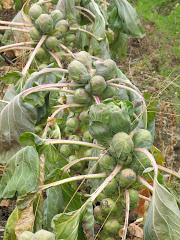We moved our pullets this week. Chickens are known as chicks until they develop feathers and grow their wings out, pullets until they start laying, and hens for the rest of their lives. We ordered ours in January, and they've been living in our smallest chicken coop next to the home garden. They outgrew the heat lamp and cramped space long ago, and have been free-ranging over the sleeping garden and lawn for the past few weeks. On Thursday, we decided it was time to move them to their new home, our chicken tractor, or mobile chicken coop. We hitch this up to the tractor, and can pull it anywhere we want. This summer, the chickens will be out on pasture, gobbling up delicious grubs and worms, pecking at cow patties, and fertilizing our fields. We'll move them every couple days. For now, their new place of residence is down past the barn, in a swampy, muddy area the pigs just vacated. They seem to like their new home just fine.
Moving chickens is a delicate affair. They are fast, and nearly impossible to catch, so the best way to do it is to wait until evening, after they have gone to roost. Chickens naturally go to roost at sunset, which is convient for us, because all we have to do is wait for them to go inside, and then close the coop door. In order to move them, we pulled their new mobile home up alongside their old coop and waited for sunset. Once the last chicken had gone inside, we started. About eight of us lined up outside the coop. Olivier went inside and started handing us chickens. We tucked one under each arm, carried them the twenty feet to the new coop, and deposited them inside. With eight of us, it only took about twenty minutes to move sixty birds from one coop to another. Alone, it would have taken an hour at least.
We stayed quiet in order to keep the birds calm. It was a cool evening, spring-scented, the ground still wet from recent rain, the first stars twinkling in the sky. Eight of us moved softly, chickens tucked under our arms, not much noise other than the occasional chicken squabble, our laughter, and farm stories.
There is nothing scared or extraordinary about moving chickens. Like most everything else I love about farming, it is the simplicity of it that stays with me, the warmth of a chicken tucked under my arm, the camaraderie, the softness of the night and the way it smelled, the shuffling sounds of chickens getting used to their new home. It might not have been extraordinary, but I can't think of a better way to pass a half hour on a star-sprinkled, sweet-smelling spring evening.
Saturday, April 25, 2009
Subscribe to:
Post Comments (Atom)





































































No comments:
Post a Comment